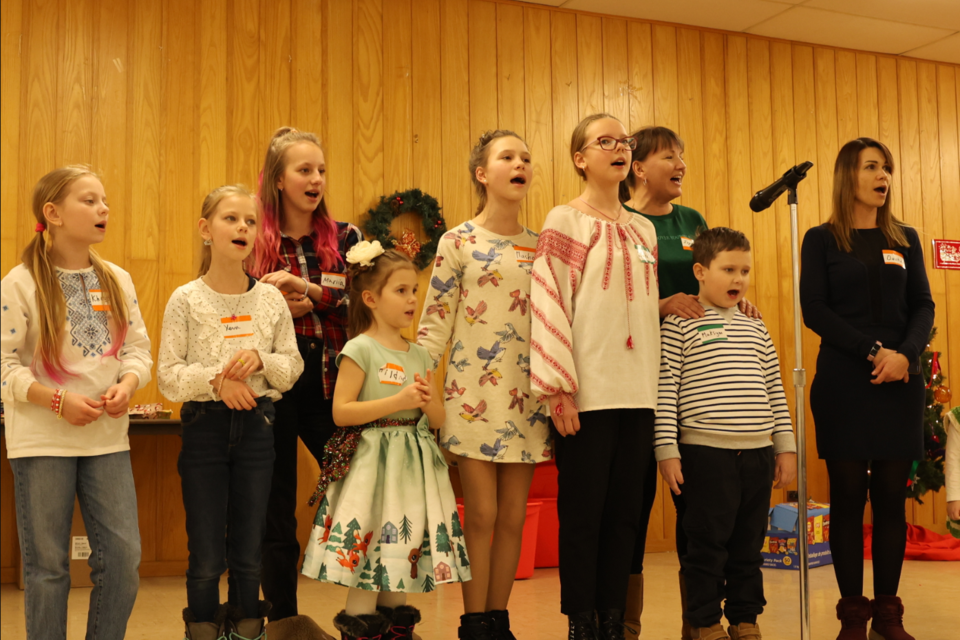Moose Jaw has become a popular destination for hundreds of Ukrainian refugees looking for a new place to live, either temporarily or permanently, with six new families expected to arrive soon.
A family already living here is bringing over a relative, while two families are coming from rural Quebec, explained Christy Schweiger, co-ordinator of the Facebook group “Ukraine help and exchange in Moose Jaw.”
Furthermore, a family living in India contacted the Ukrainian Canadian Congress and was pointed to Moose Jaw because of the support the community has been providing people fleeing their war-torn country.
Many have also contacted Schweiger directly because they’ve discovered her name attached to the Facebook group while looking online for suitable places to live.
“We’re kind of building a reputation, I think, through various sources,” she said.
Moose Jaw has a long history of Ukrainian immigration, as many moved here in the early 1900s as the railway expanded west, Schweiger continued. In fact, South Hill was known as “Garlic Heights,” while there were many churches of Ukrainian descent and more students who spoke Ukrainian than English at Westmount School when it first opened.
“So, it’s nice to reinvigorate the community because … of those cultural roots and backgrounds and people are willing to help out — so I love it!” she added.
When Schweiger posts a message on Facebook, group members usually offer items, a place to live, or even a job. She made a post recently looking for a farm job and received a reply almost immediately.
“So, everything is a beautiful combination of people helping in the community in various ways,” she stated.
The six new families — a seventh arrived earlier this year — will have accommodations when they come in the next month, although a couple with five children will require bedding and bunkbeds, said Schweiger.
Moreover, these families will require inexpensive vehicles for errands, while others need educational support for their kids and someone who can offer low-cost sporting or cultural opportunities.
Many refugees usually flourish once they establish themselves in the community, as shown by the families that have arrived in the past year who have found jobs and schools for their kids, said Schweiger. Although some refugees lack English skills, they are hard-working and independent and can use Google Translate to communicate on the job.
Residents who want to donate household items should check the Facebook page because Schweiger makes regular requests for goods; they should hang onto items until they see a post. However, clothing donations are not required because newcomers normally bring their own.
“Oftentimes when they are coming from Europe — or wherever they’re coming from — they have everything before they even arrive here,” she said.
Schweiger has helped 20 to 30 families through the Facebook group but doesn’t have an exact number of arrivals because many have come independently or had existing families help them. But, one benefit of coming to a smaller place like Moose Jaw is refugees don’t slip through the cracks and receive support from dedicated volunteers.
The Facebook co-ordinator — who works with business partner Brenda Tuplin — has many volunteers, while there are over 800 people on the group page who contribute items and search for supplies.
Since Schweiger works full-time, she relies on retirees to help, such as driving newcomers to medical checkups, the food bank or an SGI licence issuer.
Recently, a volunteer helped refugee Iryna Levchenko acquire a musical instrument called a bandura, which the woman used to play when she performed with the Kyiv Symphony. She was unable to bring it on the plane because of the cost, so the volunteer provided Levchenko with the funds to buy a new one.
It’s expected that Levchenko — who has been here for nearly two years — will play her instrument during a future concert. She will likely be joined by a Ukrainian refugee coming from India, who also plays the bandura.
“What we really love to do is, the newcomers that come, we try to get them involved as much as possible to pay back the others that have helped them along the way … ,” Schweiger said. “And, also getting them linked in with other newcomers in the community so they can build their own community.”
The Facebook group encourages refugees to become involved in events regularly, such as children’s art activities, adult hand sowing, judo, kayaking and canoeing, and attending WHL games — usually the first hockey matches they’ve experienced.
“They are very excited about having the opportunity to see something as Canadiana as that,” added Schweiger, adding many Ukrainian refugees want to remain here permanently.




